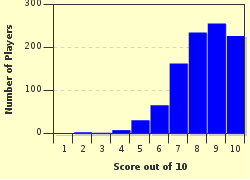Quiz Answer Key and Fun Facts
1. One classic symptom of a heart attack is chest pain. How do people typically describe the pain they feel when they are having a heart attack?
2. Is nausea (a feeling of being sick in the stomach) a symptom commonly associated with a heart attack?
3. People having a heart attack often change colour. Which of the following would you be concerned about if you saw someone's face turn this colour and you suspected they were having a heart attack?
4. You think that a family member is having a heart attack, and you have called for an ambulance. While you are waiting, the family member says that they need to go to the toilet. Is it safe to allow them to go to the toilet alone?
5. Is it possible to have a heart attack without any symptoms at all?
6. If you feel a persistent, continuing discomfort in the centre of your chest, and you feel a little bit sick, after how long should you seek medical advice if you have not had a heart attack before?
7. You may have heard the paramedics talk about chest pain and radiation. No, they are not talking about radioactive materials, they are talking about a pain that 'travels' through your body starting from your chest. Which of the following paths may indicate radiation from a heart attack?
8. My sister, who has a diagnosed heart problem, has just eaten a big roast dinner with all the trimmings. She has eaten potatoes roasted in rosemary-flavoured oil, roasted pumpkin, steamed beans and carrots, roast pork (with a double-helping of crackling) with applesauce AND gravy. She saddles up for pumpkin pie with cream for dessert. After the meal, she complains of pain in her chest, and uses the spray the doctor prescribed. Which complaint is she likely to be suffering from?
9. You are at a family gathering, and you suspect that one of your family members is having a heart attack. He is complaining of a discomfort in the middle of his chest, feels dizzy or lightheaded, is a little pale, and is having trouble breathing. What is the best method to get him to the hospital to be assessed by a doctor?
10. Which of the following is considered to be a lifestyle factor that contributes to the risk of having a heart attack?
Source: Author
ecnalubma
This quiz was reviewed by FunTrivia editor
crisw before going online.
Any errors found in FunTrivia content are routinely corrected through our feedback system.

